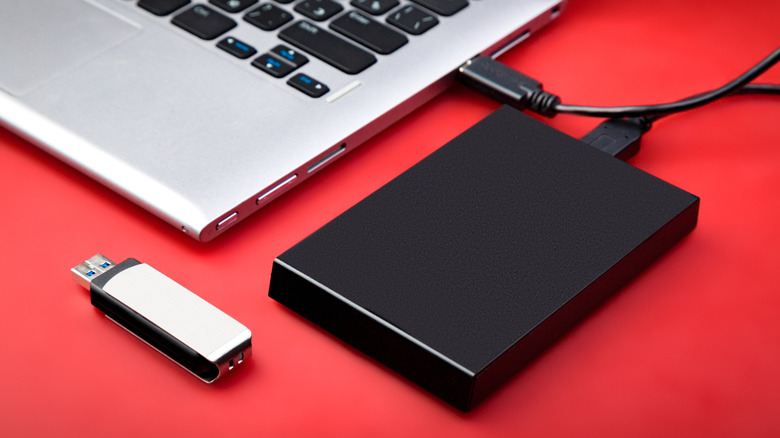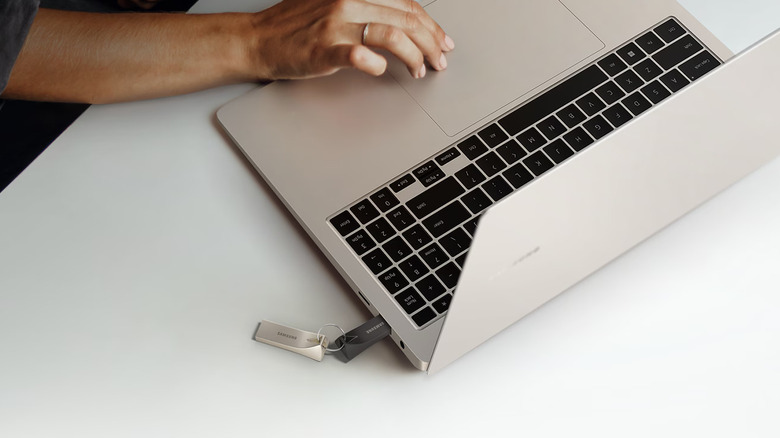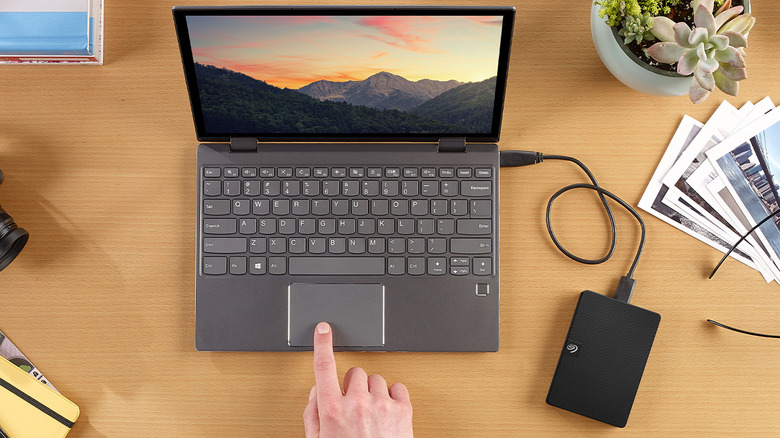USB Flash Drives Vs. External Hard Drives: What's The Difference?
We may receive a commission on purchases made from links.
Just as you need a cabinet to store your physical files, a storage device is essential for keeping your digital ones, such as photos, videos, documents, and more. While cloud storage has become a popular and convenient option in recent times, external storage devices such as USB flash drives and hard drives offer unique advantages. But what exactly is the difference between a USB flash drive and a hard drive?
The most obvious difference between USB flash drives and external hard drives is their size. Flash drives are much more compact and can easily fit in your pocket. Plus, they plug directly into devices like computers, so you don't need a separate cable. In contrast, while still portable, hard drives are about the size of a passport and noticeably heavier. They also require a separate cable, which adds to what you need to carry.
The size difference between USB flash drives and external hard drives is also reflected in their storage capacity. Hard drives typically offer much larger capacities, commonly 500GB, 1TB, 2TB, and can go to even 20TB. USB flash drives, on the other hand, usually top out at around 1TB, though you can get higher capacity models like Transcend's 2TB flash drive. The difference in storage capacity makes hard drives ideal for large backups, while flash drives are perfect for storing or transferring smaller files between your computers or even smartphones.
How do they compare in terms of speed and reliability?
External hard drives come in two main types: HDD (Hard Disk Drive) and SSD (Solid State Drive). HDDs use moving parts like spinning platters and actuator arms to read and write data. In contrast, SSDs use flash memory, similar to what's used in USB flash drives, which allows for faster performance due to the absence of moving parts. In other words, USB flash drives are generally quicker than traditional HDDs in terms of read and write speeds, but typically slower than SSDs. That said, the data transfer speeds of both USB flash drives and external drives can vary widely depending on the specific hardware and interface.
An important factor to consider when buying an external storage device is its lifespan. Since USB flash drives have no moving parts, they are more resistant to physical shocks such as drops or bumps. The same applies to SSDs, but HDDs are more fragile due to their internal mechanical components, making them more susceptible to damage from impact.
In general, HDDs have a lifespan of around three to five years, whereas SSDs can last up to seven years, though they have a limited number of write cycles. USB flash drives, when stored in ideal conditions and used moderately, can last up to 10 years or even more.
Which one is better, a flash drive or an external hard drive?
When it comes to pricing, USB flash drives are more affordable. SSDs, on the other hand, tend to be expensive, mainly due to their superior speed and higher performance. That said, HDDs are cheaper in terms of price per GB, which makes them more appealing for storing large files. Beyond storage capacity, the prices of these devices can vary widely depending on things like the brand, speed, and interface type.
All in all, both USB flash drives and external hard drives offer distinct advantages in terms of portability, storage capacity, performance, reliability, and cost. The right choice depends on how you plan to use the device. USB flash drives are compact, easy to carry, and durable, making them ideal for transferring data between devices. In contrast, external hard drives offer greater storage capacity and faster speeds if you opt for an SSD, which makes it better suited for backing up or storing large files.
You can pick between the two depending on your usage, price, and convenience. Regardless of which one you pick, it's generally best to avoid buying used flash drives or external hard drives, as the potential risks often outweigh the savings.


